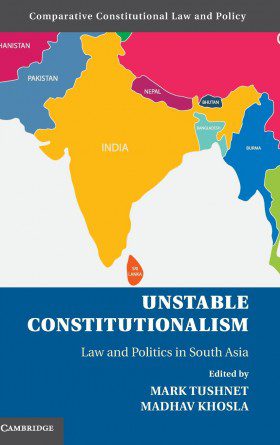 By Soujanya Ganig, Ed. M Candidate, Harvard Graduate School of Education; SAI Student Coordinator
By Soujanya Ganig, Ed. M Candidate, Harvard Graduate School of Education; SAI Student Coordinator
On November 16, SAI and Harvard Law School hosted a book talk on Unstable Constitutionalism: Law and Politics in South Asia, a book edited by Mark Tushnet and Madhav Khosla. The panelists for the event were Mark Tushnet, William Nelson Cromwell Professor of Law, Harvard Law School, Rohit De, Associate Research Scholar in Law, Yale and Nick Robinson, Resident Fellow, Center on the Legal Profession, Harvard Law School.
Tushnet started the discussion by talking about the genesis of the book, which provides a detailed examination of constitutional law and practice in five South Asian countries: India, Pakistan, Sri Lanka, Nepal, and Bangladesh. Tushnet explained that the field of comparative constitutional law is heavily dominated by Atlantic scholarship (US, European and Commonwealth countries), with little contribution from other regions in the world. Hence, they thought it would be useful to hear from the scholars in the region.
Most of the contributors of the book talk about a situation in which participants in constitutional discourse regard a creation of a constitutional order as either essential or desirable for the creation of stability in the nation. “Constitutionalism holds out the hope for all of these participants of a stable solution, and that’s what they are committed to – constitutionalism as generating stable solutions to their problems of instability that each nation faces,” said Tushnet.
Nick Robinson started by emphasizing how difficult it is to bring together an exceptional group of scholars in South Asia, as many countries in this region have nascent legal academies. He spoke in particular about the chapter by Pratap Bhanu Mehta on how the Indian Supreme Court is best viewed as a conflict manager. Speaking on the term ‘unstable constitutionalism,’ he explained how the countries in South Asia struggle to settle on stable institutional structures. This book helps create an organizing idea for dialogue across South Asia and opens up further space for theorizations and debate.
Robinson highlighted how the book discusses some common causes of unstable constitutionalism, such as the military, religion, and ethnicities, and how these might have increased traditional activism and different experiments with federalism. Speaking about what lessons can be learned from this region, he spoke about the striking power of courts in South Asia and the how courts have played a critical role in the political histories of these nations.
Rohit De began his presentation by questioning why we need to study South Asia in the first place: “It’s a collection of countries that are linked by geography. Some share a common history and other don’t.”
He spoke about the disparate constitutional and sociological systems within the South Asia region, and how, despite the fact that South Asia has many progressive constitutional texts, social reality remains very different and politics dominates constitutionalism.
De argued that instability is a virtue because it allows for those who have been shut out of the constitutional order to find a way in. He concluded his presentation by talking about the political role that judges play. He spoke about examples from Pakistan and Sri Lanka, and how Chief Justices have come under attack and judges have been removed by political masters.
The event concluded after a lively interaction with the audience.
